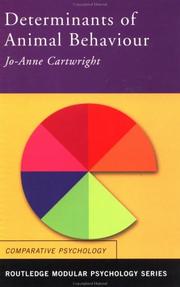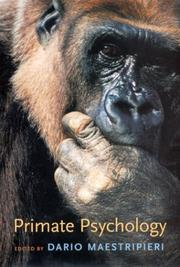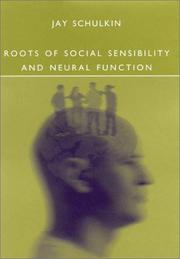| Listing 1 - 10 of 47 | << page >> |
Sort by
|

ISBN: 0415238412 0203469836 9780203469835 0203778073 9780203778074 9780415238403 0415238404 9780415238410 9786610404216 6610404216 0415238404 1280404213 9781280404214 1134556616 9781134556618 9781134556564 9781134556601 1134556608 Year: 2002 Publisher: Hove, East Sussex New York Routledge
Abstract | Keywords | Export | Availability | Bookmark
 Loading...
Loading...Choose an application
- Reference Manager
- EndNote
- RefWorks (Direct export to RefWorks)
A concise introduction to psychological theories which attempt to explain non-human animal behaviour. Theories covered include evolutionary explanations, classical and operant conditioning and social learning.
Psychology, Comparative --- #PBIB:2004.4 --- Behavior, Comparative --- Comparative behavior --- Comparative psychology --- Ethology, Comparative --- Intelligence of animals --- Zoology --- Animal behavior --- Animal intelligence --- Animal psychology --- Human behavior --- Instinct --- Psychology, Comparative.

ISBN: 1107128609 1280432543 0511066627 1139146246 0511180810 0511060319 0511326459 0511542283 0511068751 9780511066627 9780511180811 9780511542282 9780511068751 0521770300 9780521770309 9780511060311 9780521283328 0521283329 Year: 2002 Publisher: Cambridge, UK New York Cambridge University Press
Abstract | Keywords | Export | Availability | Bookmark
 Loading...
Loading...Choose an application
- Reference Manager
- EndNote
- RefWorks (Direct export to RefWorks)
It is well known that children's activities are full of pretending and imagination, but it is less appreciated that animals can also show similar activities. Originally published in 2002, this book focuses on comparing and contrasting children's and animals' pretenses and imaginative activities. In the text, overviews of research present conflicting interpretations of children's understanding of the psychology of pretense, and describe sociocultural factors which influence children's pretenses. Studies of nonhuman primates provide examples of their pretenses and other simulative activities, explore their representational and imaginative capacities and compare their skills with children. Although the psychological requirements for pretending are controversial, evidence presented in this volume suggests that great apes and even monkeys may share capacities for imagination with children, and that children's early pretenses may be less psychological than they appear.
Imagination in children. --- Psychology, Comparative. --- Behavior, Comparative --- Comparative behavior --- Comparative psychology --- Ethology, Comparative --- Intelligence of animals --- Zoology --- Animal behavior --- Animal intelligence --- Animal psychology --- Human behavior --- Instinct --- Child psychology

ISBN: 0674040422 9780674040427 067401152X 9780674011526 0674265734 0674018478 Year: 2003 Publisher: Cambridge, MA Harvard University Press
Abstract | Keywords | Export | Availability | Bookmark
 Loading...
Loading...Choose an application
- Reference Manager
- EndNote
- RefWorks (Direct export to RefWorks)
This book, one of the few comprehensive attempts at integrating behavioral research into human and nonhuman primates, does precisely that--and in doing so, offers a clear, in-depth look at the mutually enlightening work being done in psychology and primatology. The authors focus primarily on social processes in areas including aggression, conflict resolution, sexuality, attachment, parenting, social development and affiliation, cognitive development, social cognition, personality, emotions, vocal and nonvocal communication, cognitive neuroscience, and psychopathology.
Psychology, Comparative. --- Psychology --- Social Sciences --- Behavior, Comparative --- Comparative behavior --- Comparative psychology --- Ethology, Comparative --- Intelligence of animals --- Zoology --- Animal behavior --- Animal intelligence --- Animal psychology --- Human behavior --- Instinct
Book
ISBN: 0231541759 9780231541756 9780231178327 0231178328 Year: 2016 Publisher: New York, NY
Abstract | Keywords | Export | Availability | Bookmark
 Loading...
Loading...Choose an application
- Reference Manager
- EndNote
- RefWorks (Direct export to RefWorks)
Animals fall in love, establish rules for fair play, exchange valued goods and services, hold "funerals" for fallen comrades, deploy sex as a weapon, and communicate with one another using rich vocabularies. Animals also get jealous and violent or greedy and callous and develop irrational phobias, just like us. Monkeys address inequality, wolves miss each other, elephants grieve for their dead, and prairie dogs name the humans they encounter. Human and animal behavior is not as different as once believed.In Not So Different, the biologist Nathan H. Lents argues that the same evolutionary forces of cooperation and competition have shaped both humans and animals. Identical emotional and instinctual drives govern our actions. By acknowledging this shared programming, the human experience no longer seems unique, but in that loss we gain a fuller appreciation of such phenomena as sibling rivalry and the biological basis of grief, helping us lead more grounded, moral lives among animals, our closest kin. Through a mix of colorful reporting and rigorous scientific research, Lents describes the exciting strides scientists have made in decoding animal behavior and bringing the evolutionary paths of humans and animals closer together. He marshals evidence from psychology, evolutionary biology, cognitive science, anthropology, and ethology to further advance this work and to drive home the truth that we are distinguished from animals only in degree, not in kind.
Animal behavior. --- Psychology, Comparative. --- Behavior, Comparative --- Comparative behavior --- Comparative psychology --- Ethology, Comparative --- Intelligence of animals --- Zoology --- Animal behavior --- Animal intelligence --- Animal psychology --- Human behavior --- Instinct --- Animals --- Animals, Habits and behavior of --- Behavior, Animal --- Ethology --- Ethologists --- Psychology, Comparative --- Behavior

ISBN: 0521580277 9780521580274 0511053851 9780511053856 0511174942 9780511174940 0511039786 9780511039782 9780521031936 0521031931 1107113695 1280418613 9786610418619 0511155050 0511542305 0511328591 9780511542305 Year: 1999 Publisher: Cambridge Cambridge University Press
Abstract | Keywords | Export | Availability | Bookmark
 Loading...
Loading...Choose an application
- Reference Manager
- EndNote
- RefWorks (Direct export to RefWorks)
Research on the mental abilities of chimpanzees and bonobos has been widely celebrated and used in reconstructions of human evolution. In contrast, less attention has been paid to the abilities of gorillas and orangutans. This 1999 volume aims to help complete the picture of hominoid cognition by bringing together the work on gorillas and orangutans and setting it in comparative perspective. The introductory chapters set the evolutionary context for comparing cognition in gorillas and orangutans to that of chimpanzees, bonobos and humans. The remaining chapters focus primarily on the kinds and levels of intelligence displayed by orangutans and gorillas compared to other great apes, including performances in the classic domains of tool use and tool making, imitation, self-awareness, social communication and symbol use. All those wanting more information on the mental abilities of these sometimes neglected, but important primates will find this book a treasure trove.
Gorilla --- Orangutan --- Psychology, Comparative. --- Psychology. --- Behavior [Comparative ] --- Comparative behavior --- Comparative psychology --- Ethology [Comparative ] --- Intelligence of animals --- Psychologie [Vergelijkende ] --- Psychologie comparée --- Psychology [Comparative ] --- Vergelijkende psychologie --- Psychology --- Behavior --- Behavior, Comparative --- Ethology, Comparative --- Zoology --- Animal behavior --- Animal intelligence --- Animal psychology --- Human behavior --- Instinct --- Bornean orang-utan --- Orang-utan --- Orang-utans --- Pongo pygmaeus --- Simia satyrus --- Orangutans --- Gorilla gorilla --- Gorillas --- Lowland gorilla --- Western gorilla --- Gorilla (Genus) --- Faunus --- Lophotus --- Macrobates --- Orang-outang --- Pongo --- Satyrus --- Hominids
Book
ISBN: 9780674724778 0674724771 9780674726369 9780674986831 0674726367 0674727568 9780674727564 Year: 2014 Publisher: Cambridge, Mass. Harvard University Press
Abstract | Keywords | Export | Availability | Bookmark
 Loading...
Loading...Choose an application
- Reference Manager
- EndNote
- RefWorks (Direct export to RefWorks)
Tool-making or culture, language or religious belief: ever since Darwin, thinkers have struggled to identify what fundamentally differentiates human beings from other animals. Michael Tomasello weaves his twenty years of comparative studies of humans and great apes into a compelling argument that cooperative social interaction is the key to our cognitive uniqueness. Tomasello maintains that our prehuman ancestors, like today's great apes, were social beings who could solve problems by thinking. But they were almost entirely competitive, aiming only at their individual goals. As ecological changes forced them into more cooperative living arrangements, early humans had to coordinate their actions and communicate their thoughts with collaborative partners. Tomasello's "shared intentionality hypothesis" captures how these more socially complex forms of life led to more conceptually complex forms of thinking. In order to survive, humans had to learn to see the world from multiple social perspectives, to draw socially recursive inferences, and to monitor their own thinking via the normative standards of the group. Even language and culture arose from the preexisting need to work together and coordinate thoughts. A Natural History of Human Thinking is the most detailed scientific analysis to date of the connection between human sociality and cognition.
Cognitive psychology --- Developmental psychology --- Cognition --- Evolutionary psychology. --- Psychology, Comparative. --- Social aspects. --- Behavior, Comparative --- Comparative behavior --- Comparative psychology --- Ethology, Comparative --- Intelligence of animals --- Zoology --- Animal behavior --- Animal intelligence --- Animal psychology --- Human behavior --- Instinct --- Psychology --- Human evolution --- Evolutionary psychology --- Psychology, Comparative --- Social aspects --- Ontwikkelingspsychologie --- Cognitieve psychologie --- Cognition-Social aspects.
Periodical
ISSN: 08893667 21683344
Abstract | Keywords | Export | Availability | Bookmark
 Loading...
Loading...Choose an application
- Reference Manager
- EndNote
- RefWorks (Direct export to RefWorks)
Psychology, Comparative --- Psychologie comparée --- Periodicals. --- Périodiques --- Psychology, Comparative. --- Health Sciences --- General and Others --- Neurology --- Psychiatry & Psychology --- cognition --- comparative psychology --- animal communication --- decision processes --- cognitive neuroscience --- social behaviour --- Comparative Psychology --- Comparative Psychologies --- Psychologies, Comparative --- Behavior, Comparative --- Comparative behavior --- Comparative psychology --- Ethology, Comparative --- Intelligence of animals --- Zoology --- Animal behavior --- Animal intelligence --- Animal psychology --- Human behavior --- Instinct --- Psychology

ISBN: 0262194473 026228328X 1423726634 9780262283281 9780262194471 9781423726630 Year: 2000 Publisher: Cambridge, Mass. MIT Press
Abstract | Keywords | Export | Availability | Bookmark
 Loading...
Loading...Choose an application
- Reference Manager
- EndNote
- RefWorks (Direct export to RefWorks)
We are social animals, with evolved mechanisms to discern the beliefs and desires of others. This social reason is linked to the concept of intentionality, the ability to attribute beliefs and desires to others. In this book Jay Schulkin explores social reason from philosophical, psychological, and cognitive neuroscientific perspectives. He argues for a pragmatist approach, in which the role of experience--that is, interaction with others--is central to any consideration of action in the social world. Unlike some philosophers of mind, Jay Schulkin considers social reason to be a real feature of the information processing system in the brain, in addition to a useful cognitive tool in predicting behavior. Throughout the book, he incorporates neurobiological evidence for a domain-specific system for social cognition.Topics covered include the centrality of intentional attribution to social cognition, the rise of cognitive science in the twentieth century, the functional argument for the role of experience, intentional understanding in nonhuman primates, theory of mind and natural kinds in children, autism as a disorder of theory of mind, and the integration of emotions into theory of mind.
Cognition --- Cognition and culture --- Human information processing --- Psychology, Comparative --- Psychology --- Social Sciences --- Social aspects --- Cognition and culture. --- Psychology, Comparative. --- Social aspects. --- Behavior, Comparative --- Comparative behavior --- Comparative psychology --- Ethology, Comparative --- Intelligence of animals --- Information processing, Human --- Culture and cognition --- Zoology --- Animal behavior --- Animal intelligence --- Animal psychology --- Human behavior --- Instinct --- Bionics --- Information theory in psychology --- Perception --- Culture --- Ethnophilosophy --- Ethnopsychology --- Socialization --- COGNITIVE SCIENCES/General --- NEUROSCIENCE/General
Book
ISBN: 1282285580 9786612285585 0080922651 0123744741 Year: 2009 Publisher: Amsterdam ; Boston : Elsevier/AP,
Abstract | Keywords | Export | Availability | Bookmark
 Loading...
Loading...Choose an application
- Reference Manager
- EndNote
- RefWorks (Direct export to RefWorks)
Advances in the Study of Behavior was initiated over 40 years ago to serve the increasing number of scientists engaged in the study of animal behavior. That number is still expanding. This volume makes another important ""contribution to the development of the field"" by presenting theoretical ideas and research to those studying animal behavior and to their colleagues in neighboring fields. Advances in the Study of Behavior is now available online at ScienceDirect full-text online from volume 30 onward.
Animal behavior. --- Human behavior. --- Psychology, Comparative. --- Behavior, Comparative --- Comparative behavior --- Comparative psychology --- Ethology, Comparative --- Intelligence of animals --- Zoology --- Animal behavior --- Animal intelligence --- Animal psychology --- Human behavior --- Instinct --- Action, Human --- Behavior, Human --- Ethology --- Human action --- Human beings --- Human biology --- Physical anthropology --- Psychology --- Social sciences --- Psychology, Comparative --- Animals --- Animals, Habits and behavior of --- Behavior, Animal --- Ethologists --- Behavior

ISBN: 1280751363 9786610751365 0080468934 0120045362 0123992788 9780120045365 9780080468938 9780080468938 Year: 2006 Publisher: New York : Academic Press,
Abstract | Keywords | Export | Availability | Bookmark
 Loading...
Loading...Choose an application
- Reference Manager
- EndNote
- RefWorks (Direct export to RefWorks)
The aim of Advances in the Study of Behavior is to serve scientists engaged in the study of animal behavior, including psychologists, neuroscientists, biologists, ethologists, pharmacologists, endocrinologists, ecologists, and geneticists. Articles in the series present critical reviews of significant research programs with theoretical syntheses, reformulation of persistent problems, and/or highlighting new and exciting research concepts. Advances in the Study of Behavior is now available online at
Animal behavior.
---
Human behavior.
---
Psychology, Comparative.
---
Behavior, Comparative
---
Comparative behavior
---
Comparative psychology
---
Ethology, Comparative
---
Intelligence of animals
---
Zoology
---
Animal behavior
---
Animal intelligence
---
Animal psychology
---
Human behavior
---
Instinct
---
Action, Human
---
Behavior, Human
---
Ethology
---
Human action
---
Human beings
---
Human biology
---
Physical anthropology
---
Psychology
---
Social sciences
---
Psychology, Comparative
---
Animals
---
Animals, Habits and behavior of
---
Behavior, Animal
---
Ethologists
---
Behavior
| Listing 1 - 10 of 47 | << page >> |
Sort by
|

 Search
Search Feedback
Feedback About UniCat
About UniCat  Help
Help News
News